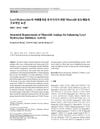 January 2020 in “bioRxiv (Cold Spring Harbor Laboratory)”
January 2020 in “bioRxiv (Cold Spring Harbor Laboratory)” Semecarpus anacardium leaf extracts may offer safe, effective cancer treatment alternatives.
 December 2018 in “Neuroradiology”
December 2018 in “Neuroradiology” MRI helps distinguish between pituitary adenomas and craniopharyngiomas, guides treatment for pediatric CNS tumors, and assesses rhinocerebral mucormycosis with a high mortality rate in transplanted patients.
 May 2017 in “bioRxiv (Cold Spring Harbor Laboratory)”
May 2017 in “bioRxiv (Cold Spring Harbor Laboratory)” The peach gene pCTG134 helps control the interaction between auxin and ethylene hormones during fruit ripening.
 September 2016 in “Springer eBooks”
September 2016 in “Springer eBooks” Fat-derived stem cells may help treat skin aging and hair loss.
 April 2015 in “Andrology”
April 2015 in “Andrology” HNG may help prevent the negative effects of chemotherapy on sperm production and white blood cell counts.
 January 2015 in “Springer eBooks”
January 2015 in “Springer eBooks” Fat-derived stem cells and their secretions show promise for treating skin aging and hair loss.
 April 2012 in “KSBB Journal”
April 2012 in “KSBB Journal” Minoxidil analogs can be improved for hair growth inhibition by modifying specific parts of their structure.
 December 2008 in “Enzyme and Microbial Technology”
December 2008 in “Enzyme and Microbial Technology” New patents include innovations in skin and hair care, disease treatment, plant stress tolerance, and protein purification.
 August 2008 in “European Neuropsychopharmacology”
August 2008 in “European Neuropsychopharmacology” Some teenagers with anorexia nervosa have worse cognitive abilities, especially in visual and spatial tasks, and this is more common in those with a lower body weight.
 March 2008 in “Aging health”
March 2008 in “Aging health” Docetaxel is safe and works well for older people with cancer, with manageable side effects.
 January 1990 in “Springer eBooks”
January 1990 in “Springer eBooks” Some chemicals can permanently or temporarily remove color from skin and hair, which can be distressing and is not well-regulated in cosmetics.
 January 2020 in “Química Nova”
January 2020 in “Química Nova” The PW91 method is best for calculating the basic physical and chemical properties of Finasteride, a drug used for prostate issues and hair loss.
 June 2001 in “International Journal of Cosmetic Surgery and Aesthetic Dermatology”
June 2001 in “International Journal of Cosmetic Surgery and Aesthetic Dermatology” Finasteride improves hair growth in men with androgenetic alopecia.
20 citations,
October 1995 in “PubMed” 17 citations,
March 1992 in “PubMed”  2 citations,
November 2021 in “International Journal of Applied Pharmaceutics”
2 citations,
November 2021 in “International Journal of Applied Pharmaceutics” The phytosome lotion made from Mangkokan leaf extract was more effective for hair growth than 2% minoxidil, especially at 30% concentration.
81 citations,
February 2014 in “EMBO molecular medicine” Activating Nrf2 in skin cells causes skin disease similar to chloracne in mice.
11 citations,
October 2003 in “PubMed” Treatments with certain oils and resins make hair shinier, while zinc oxide and synthetic sebum make it duller.
5 citations,
January 1997 in “PubMed” 5 citations,
January 1994 in “PubMed” 62 citations,
December 2007 in “Journal of biological chemistry/The Journal of biological chemistry” A specific chemical change in the S100A3 protein leads to the formation of a four-part structure important for hair formation.
50 citations,
May 2021 in “Frontiers in immunology” Certain immune cells contribute to skin autoimmune diseases, and some treatments can reverse hair loss in these conditions.
35 citations,
August 2009 in “Differentiation” Desmoglein 4 is controlled by specific proteins that affect hair growth.
29 citations,
May 2007 in “International journal of pharmaceutics” Different compounds move through artificial sebum at different rates, which can help choose the best ones for targeting hair follicles.
23 citations,
December 2013 in “Molecular cancer therapeutics” Breast cancer treatments work better with AR activation, improving results and reducing side effects.
 20 citations,
June 2022 in “Molecules”
20 citations,
June 2022 in “Molecules” Thiazole, a sulfur and nitrogen chemical, is useful in creating potential drugs for conditions like seizures, cancer, bacterial infections, tuberculosis, inflammation, malaria, viruses, Alzheimer's, diabetes, and A1-receptor issues.
18 citations,
June 2010 in “Cell Stress and Chaperones” Heat treatment increases hair loss in certain mice.
 13 citations,
December 2016 in “PubMed”
13 citations,
December 2016 in “PubMed” People with a common type of hair loss have higher stress levels in their body, and treatments that reduce this stress could help.
11 citations,
December 2020 in “Advanced structured materials” Natural products like coconut oil and aloe vera are beneficial in cosmetics for their healing properties.
















